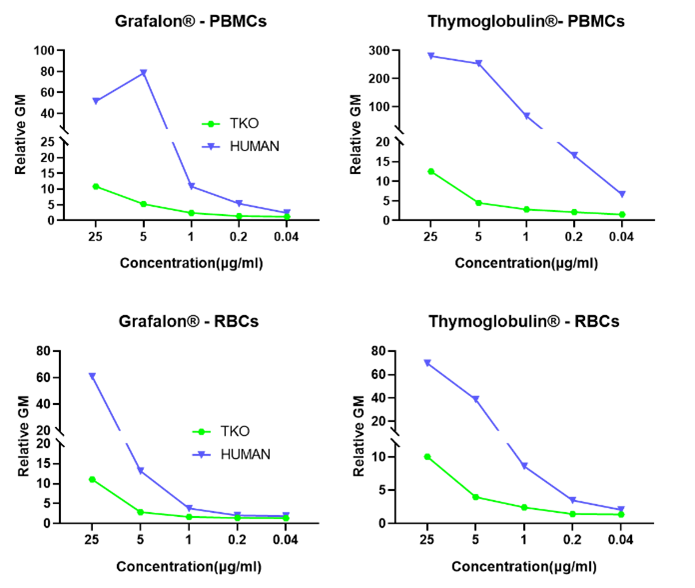Investigation of cross-reactivity of rabbit anti-thymocyte globulin with triple-knockout pig cells and potential induction of anti-triple knockout pig antibodies in kidney allotransplant recipients
Hongtao Jiang1, Jinghui Li1, Tao Li1, Hidetaka Hara1, Shuai Jin 1, Yong Wang2, Dengke Pan2, Yi Wang1.
1The Transplantation Institute of the Second Affiliated Hospital, Hainan Medical University, Haikou, People's Republic of China; 2Chengdu Clonorgan Biotechnology Co., Ltd, Chengdu, People's Republic of China
Introduction: Compared to allotransplantation, it is crucial in xenotransplantation to determine whether administered agents contain antibodies that react with pig antigens or share epitopes with pig cells. Rabbit-derived anti-thymocyte globulin (rATG), commonly used for induction therapy, has been shown to display xenoantigens such as galactose-alpha-1,3-galactose (Gal) and N-glycolylneuraminic acid (Neu5Gc) on its Fab and Fc portions. However, it remains unknown whether rATG (i) contains antibodies that cross-react with triple-knockout (TKO) pig cells, or (ii) induces the production of anti-TKO pig antibodies by sharing antigens with TKO pigs after administration.
Methods: We evaluated the direct IgG binding of two types of rATG (Grafalon® and Thymoglobulin®) to TKO pig and human peripheral blood mononuclear cells (PBMCs) and red blood cells (RBCs) by flow cytometry. In addition, plasma samples from 31 kidney allotransplant recipients treated with Grafalon® (n=11) or Thymoglobulin® (n=20) were collected, and anti-TKO pig antibody levels were assessed before and up to four weeks after induction therapy. Both groups received a similar maintenance immunosuppressive regimen consisting of tacrolimus, mycophenolate mofetil (with or without rapamycin), and methylprednisolone.
Results: Both Grafalon® and Thymoglobulin® demonstrated detectable IgG binding to TKO pig cells, although the binding levels were significantly lower than those to human cells (relative geometric mean [rGM]: TKO; 10–15 vs human; 50–300) (Figure 1). Following rATG administration, no consistent overall increase in anti-TKO IgG was observed. However, several recipients exhibited a significant rise in anti-TKO IgM and/or IgG levels compared to their pre-transplant baseline.

Conclusion: This study provides the first evidence that rATG contains antibodies cross-reactive with TKO pig antigens and may induce anti-TKO antibody responses following administration. In addition, our findings suggest that rATG may harbor antigens shared with TKO pigs and could stimulate B-cell responses either specifically or nonspecifically. While our findings do not imply that the use of rATG should be avoided in xenotransplantation, they highlight the need for careful protocol design. Specifically, timing strategies — such as administering rATG prior to transplantation rather than post-transplant — should be considered to minimize potential antibody-mediated xenograft injury. Thorough evaluation of induction agents, particularly animal-derived products, is essential to ensure the safety and success of future clinical xenotransplantation trials.
[1] rabbit anti-thymocyte globulin
[2] triple-knockout (TKO) pig
[3] kidney allotransplant recipients
[4] cross-reactivity